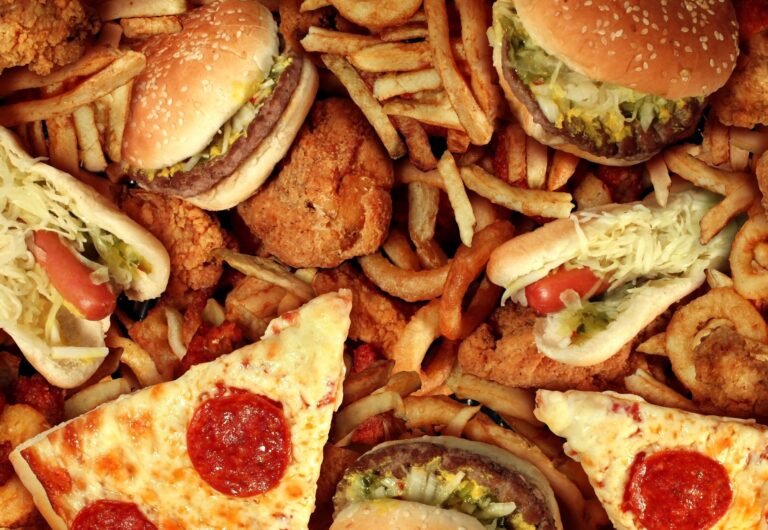In a recent review published in the journal Nature Reviews Gastroenterology & Hepatologyresearchers synthesized current knowledge about how food additives and ultra-processed foods (UPFs) affect gut health.
As UPFs and food additives become more common in diets worldwide, they have been implicated in adverse gut outcomes such as alterations in microbial communities and intestinal permeability, leading to chronic inflammation or diseases such as inflammatory bowel disease (IBD), irritable bowel syndrome bowel (IBS). and colon cancer. However, human intervention studies on this topic are limited.
Study: Ultra-processed foods and food additives for gut health and disease. Image credit: Lightspring / Shutterstock
UPF identification
To classify foods as UPF, nutritionists use criteria related to how different a product is from the original unprocessed ingredient, how it is processed, whether additives have been used, whether it is commercially produced instead of homemade, and whether it is used for appearance or convenience . .
However, different classification systems make comparisons difficult. the most common has been adopted by the Food and Agriculture Organization of the United Nations and includes powdered and packaged foods, carbonated soft drinks and sugary breakfast cereals as UPF. However, some foods, such as whole-wheat bread and plant-based meat alternatives, are widely considered healthy but qualify for the UPF.
UPF consumption and gut health
While UPFs are widespread, there are large differences between individuals and countries. In the United States, UPF consumption accounts for 59.7% and 67% of energy intake in American adults and youth, respectively.
Individual characteristics associated with consuming more UPF include female sex, younger age, lower income, lower education, living alone, being overweight or obese, lower physical activity, and screen use during meals.
People who consume more UPF have more free sugars, saturated fat, and energy in their diets but less dietary fiber, protein, and many micronutrients. Vegetarians and vegans are more likely to consume UPF, while those following Mediterranean diets consume less.
Controlling for dietary quality and nutrient intake, there is evidence of an association between UPF consumption and disease. However, UPF intake from fruit yogurts, fortified breakfast cereals and wholemeal bread is healthier than the same level of UPF consumption from ready meals, burgers and pastries.
Cohort studies have found that UPF consumption is associated with higher mortality and morbidity from cancer, cardiovascular disease, and type 2 diabetes. Observational studies show associations with depression, metabolic syndrome, overweight, and obesity. These effects likely come from the processing rather than the nutrient and energy content of UPFs.
Additionally, cohort studies looking at UPF consumption and IBD (ulcerative colitis and Crohn’s disease) found that those who consumed more UPF faced the highest risk. Similar results were found when examining only Crohn’s disease but not ulcerative colitis. A cohort study found significant associations between UPF consumption and IBS and functional dyspepsia but not functional diarrhea or constipation. UPF intake has also been implicated in male distal colon cancer and colon adenoma.
Due to methodological inconsistencies, including the use of self-reported dietary data, results may be biased, and comparisons between studies and the use of meta-analytic methods are limited. The negative health effects associated with UPFs may be due to their effect on the gut microbiome, but this has only been investigated in two studies.
Effects of food additives
Food additives include sweeteners, colors, stabilizers, emulsifiers, thickeners and gelling agents. There is significant overlap between UPFs and food additives, as an item containing a commercial food additive is considered a UPF. Mechanistic studies of the effect of food additives on the microbiome have included animal and in vitro studies, with few investigations in human populations.
In vitro studies show that emulsifiers such as polysorbate 80 can cause bacterial overgrowth of the small intestine, while carboxymethylcellulose (CMC) can translocate bacteria to the in vitro epithelium. This could lead to chronic inflammatory disease, which has been shown in mouse studies. Consumption of CMC and polysorbate 80 was also associated with tumor growth and anxiety-like behaviors in mice.
Artificial sweeteners, which pass through the gastrointestinal tract but are not digested, come into direct contact with the gut microbiota, but this has not been well studied in humans. However, in vitro and animal studies show that sweeteners such as aspartame, sucralose, and saccharin can modify the microbiome, disrupt gut permeability, shorten colon length, and increase mortality.
However, these were short-term studies with much higher doses than those used in humans. An observational study in humans found no differences in microbial consumption after four days of sweetener consumption, but did not control for background diet and dose-response relationships.
A randomized controlled trial found that constipation, diarrhea, heartburn, and postprandial discomfort increased after five weeks of consuming sweeteners, while epigastric pain, early satiety, and abdominal pain were lower in a control group on a low-sweetener diet .
conclusions
There is clear evidence that UPFs and food additives lead to adverse health outcomes, but methodological inconsistencies and gaps in human testing need to be addressed. The authors emphasize the need for high-quality evidence to interpret the effects of dietary interventions. As UPF availability and consumption increase, public health policy should aim to reshape UPF and consumer behavior.
